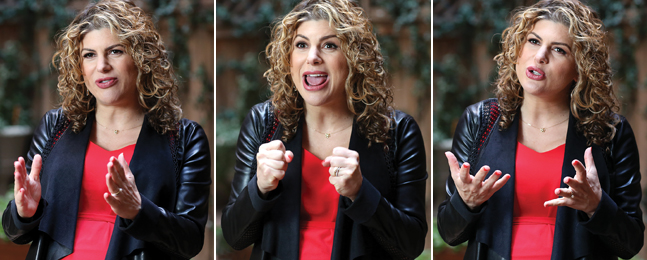The Brandeis Questionnaire
Deborah Berebichez ’96

Mike Lovett
You think too much. You ask too many questions. Stop fighting against what has always been.
Growing up female in a Jewish family in Mexico City, Deborah Berebichez ’96 was told this. A lot. Yet she went on to become the first woman from Mexico to earn a PhD in physics from Stanford.
Today, she’s the chief data scientist at Metis, an innovative career accelerator for data-science students and professionals. For six years in a row, she’s been at the top of Future-ish’s “Stylish Scientists” list. She appears regularly on TV and the internet, explaining physics in layman’s terms on the Science Channel’s “Outrageous Acts of Science,” on other cable shows, on social media, at TED Talks.
A natural in math and science as a child, Berebichez was redirected by family and teachers toward more “feminine” studies. After two years of undergraduate work in philosophy in Mexico, she got a Wien scholarship to finish her bachelor’s at Brandeis, where she took her first college-level science course, in astronomy. She discovered what she’d suspected all along: She was a scientist at heart.
Brandeis agreed to let her squeeze a four-year physics curriculum into two years (the length of her scholarship) if — and it was a big if — she could pass a tough exam in vector calculus. Her inspiration: Edward Witten ’71, the father of string theory, who had switched his major from history to physics midway through his own Brandeis career.
Berebichez studied for several months with an encouraging TA, Roopesh Ojha, PhD’98. She passed the vector calculus test. Her ascent in the science firmament began. Now her true mission, she says, is helping women and other minorities enter STEM fields. She mentors girls in groups and one-on-one. She’s developed a data-science curriculum for high-school girls. She opens doors.
Because who should be held back from the joy of discovery?
What was your idea of perfect happiness when you were at Brandeis?
Living off-campus.
When or where were you most miserable at Brandeis?
When I ate in the cafeteria.
Who was your favorite Brandeis professor?
Palle Yourgrau and Jerry Samet, in the philosophy department.
Where did you usually spend Saturday night?
Sorry, but this is a family magazine. (An alternate answer: Salsa dancing in Boston.)
If you could be any other Brandeisian, who would it be?
Edward Witten.
What is the most important value you learned at Brandeis?
Friendship.
What was the most important shortcut you learned in college?
Vector notation.
Which talent did Brandeis help you develop most?
Critical thinking.
What do you wish you had studied harder?
How to study less.
What three words of advice would you give to current Brandeis students?
Follow. Your. Dreams.
If you could go back to college, what would you do differently?
Worry less about what other people think.
What would your friends say is your greatest strength?
My ability to analyze any situation in great detail.
What would your friends say is your greatest weakness?
My tendency to take things literally.
What is your blind spot?
It is the place in my visual field that corresponds to the lack of light-detecting cells in the retina.
What book do you read again and again?
“The Feynman Lectures on Physics.”
What movie changed your life?
“The Sheltering Sky.”
Which possession do you most like to look at?
A booklet containing a short story I wrote in Yiddish when I was 8 years old.
Whom would you like to sing a duet with?
Isaac Newton.
Which deadly sin is your middle name?
There’s a reason I don’t have a middle name.
Which bad break was your biggest blessing?
I got laid off from a hedge fund. Afterward, I landed a great job at MSCI, an amazing company where I worked for six years.
If you could climb into a time machine, whom would you like to hang out with?
Hedy Lamarr, born in 1914. Like me, she combined science with media: She was an actress and an engineer. (Though, if time travel is possible, why hasn’t anyone from the future shown up?)
On your deathbed, what will you be most grateful for?
That I was almost always right.
